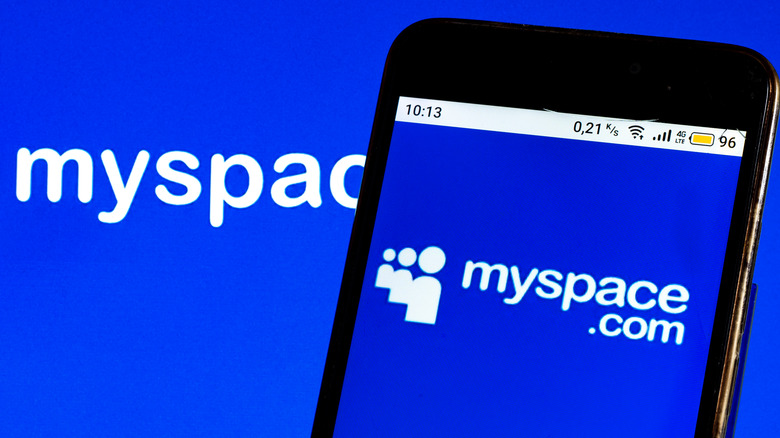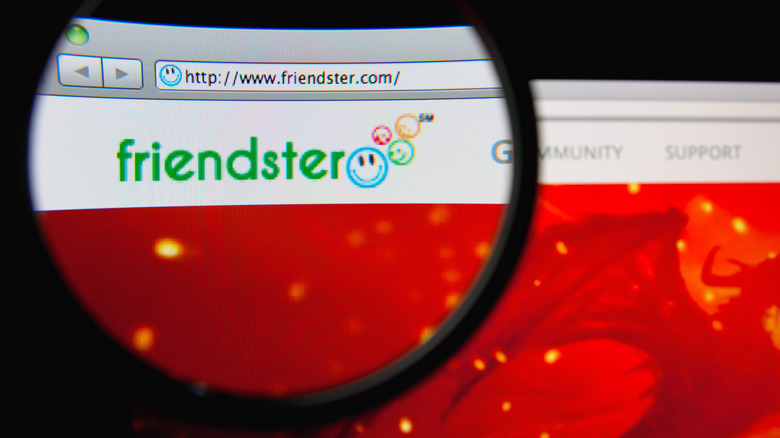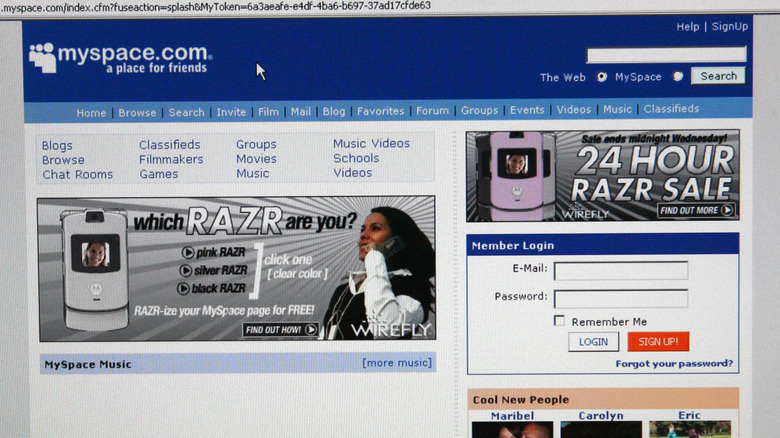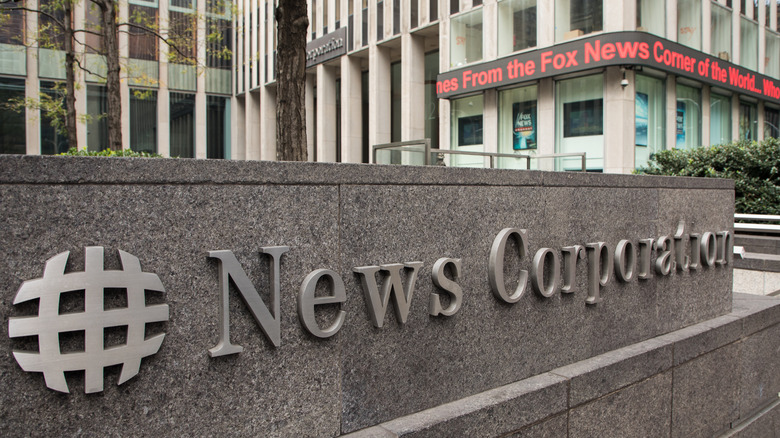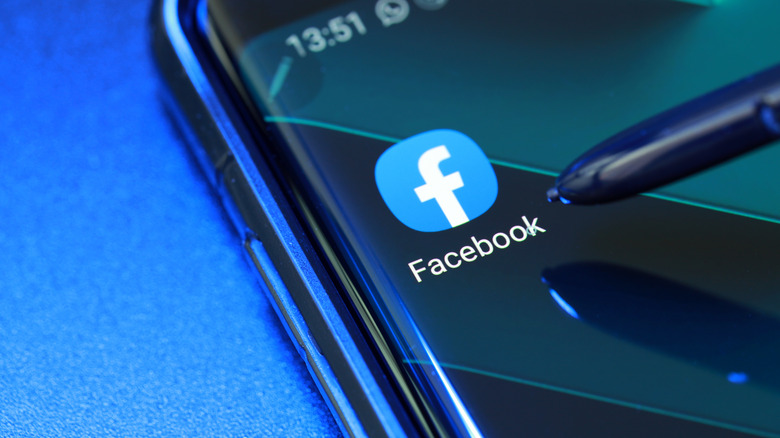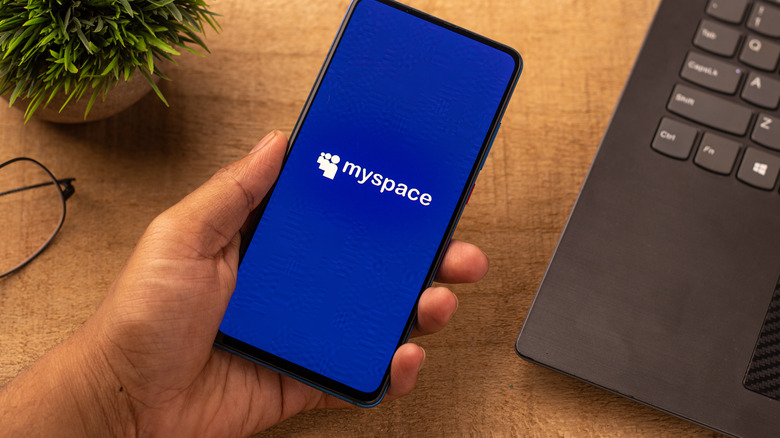What Happened To Myspace?
Like it or not, social media is a huge part of daily life for a lot of people. While social media overall isn't going away any time soon, it's a different story for the platforms themselves.
Over the years, some social media platforms have fallen out of favor while others have ingrained themselves in daily life. One of the earliest examples of a platform with a meteoric rise, followed in just a few years by whatever is the exact opposite of a meteoric rise (a meteoric plummet?), is MySpace.
However, a massive decline in popularity wouldn't be the final nail in the coffin for MySpace. These days, MySpace is more of a cultural touchstone for a generation of people who learned basic HTML just to put a My Chemical Romance song on their page and fought with their friends over who was in and who was out of their Top 8. Believe it or not, it's still around today, after a series of retoolings and reboots (via Britannica) and a wee name adjustment, to Myspace.
The beginnings of social media
It's easy to make the mistake of thinking that Myspace was one of the first social media websites. While it was one of the industry's first major successes, it had digital ancestors.
According to the Maryville University, social media's roots can be traced back to internet services like America Online, Prodigy, and CompuServe. These services offered users options to communicate through emails, message boards, and live chats.
Friendster was arguably the first truly successful platform that fits the mold of what most closely resembles modern social media platforms. It allowed for users to register for the site using their email, and it offered simple, rudimentary networking features. LinkedIn followed in 2002, and developed a different market by placing a greater focus on professional networking. Next up was Myspace in 2003, but it would take a few years before it completely transformed the social media landscape.
The early days of Myspace
Tom Anderson and Chris DeWilde created Myspace in 2003. The two worked for an internet marketing company called eUniverse, which was later renamed Intermix Media (via Britannica).
To create the site, Anderson and DeWilde pulled bits and pieces from other popular sites like Match.com, Geocities, and another early social networking website, Sixdegrees.com. DeWilde told Forbes about the site's early growth: "It was a place for creative expression. So the creative community picked it up first," he said. "It was interesting to watch the virality grow — it went to L.A. and New York and then for some reason to Hawaii. I'm not exactly sure why, but 70% of Hawaii was on Myspace early on."
DeWilde also credited the site's early growth to being in the right place at the right time. It was the beginning of the reality television boom, and of an era where everyone wanted to be famous, no matter the cost. With platforms like Myspace that suddenly became possible — and if not famous, at least widely available. Musicians and comedians started using the site to connect with fans and some like rock band Arctic Monkeys and comedian Dane Cook were able to translate their success on Myspace into ticket and record sales.
Myspace becomes the most visited site in the world
By 2005 Myspace was the top dog in the social media world, and at times it was dominating everything online, occasionally beating Google in terms of visitors. That same year it was sold to News Corp for $580 million, a massive amount of money, though as DeWilde pointed out to Forbes, it could've been a lot more. "I think we did a lot of things really right. We did a lot of things that I would take back and do differently. In hindsight, we could have waited for a year, and it would have been several billion dollars at least. By the same token, you can't look back on that," he said.
In the years that followed, Myspace found itself at the center of controversy. The site had become hugely popular with teenagers, but that worried some parents and government leaders, who were concerned that it was allowing kids to unknowingly come into contact with online sexual predators. According to Britannica, this led to Myspace finding and deleting profiles belonging to known offenders, and the platform's partnership with Sentinel Tech Holdings Corp. to develop a database of sex offenders.
Stiff competition and decline
Myspace was virtually uncontested in the social media sphere which it continued to dominate through 2008. However, by 2009 there was a problem. There was new, legitimate competition: Facebook.
Facebook was founded by Mark Zuckerberg in 2004, and while it didn't take off as rapidly as Myspace did, it wound up as the victor in the long run (via Britannica). Facebook went on to become a tech giant that has its proverbial fingers in all sorts of different companies and industries in addition to social media.
According to Forbes, DeWolfe — perhaps having read the writing on the wall — left the company in 2009, which around the time Facebook was surging. As Myspace saw a decline in membership they shifted toward a focus on music, which was one of the site's most popular features. In 2011, Myspace changed hands for the second time. This time the new owners were Specific Media — which eventually changed its name to Viant — and actor and musician Justin Timberlake. The price tag was $35 million, well below what News Corp had paid back in 2005.
MySpace today
Perhaps the most surprising piece of the Myspace story is that the site is still very much alive. Since the sale to Viant and Justin Timberlake, Myspace has been bought and sold a few times, according to Britannica. Viant was purchased by Time Inc. in 2016. However, in 2018 Time Inc. itself was purchased by the Meredith Corporation, a media company with a presence across all kinds of media, including television, print, digital, mobile, and video. In 2019, Meredith Corporation spun off Viant into a new company called Viant Technology, which Myspace falls under.
Myspace is still active today and draws millions of visitors per month, although that's nowhere near where it was during its heyday. The site looks and operates quite differently from how it did at its peak, and places a greater emphasis on music and entertainment-related content. Obviously, it's not what it once was, but Myspace is still in operation.
